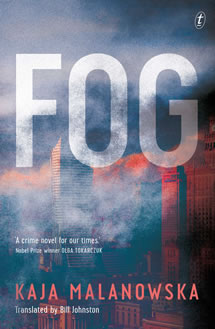Reviewed by Robert Goodman.
By Kaja Malanowksa, Text, $34.99.
 Polish author Kaja Malanowska wrote her third novel Fog (translated by Bill Johnson) as an experiment in attracting a broader readership through the crime genre. Her previous two novels, the autobiographical Drobne szaleństwa dnia codziennego (Small Madnesses of Everyday Life) in 2010, and Patrz na mnie, Klaro! (Look at Me, Klara!) in 2012 were literary fiction and she was also a columnist for a prominent left-wing intellectual periodical Krytyka polityczna (Political Critique). It is interesting to keep this all in mind when reading Fog, a crime novel that deals with a range of current Polish social issues.
Polish author Kaja Malanowska wrote her third novel Fog (translated by Bill Johnson) as an experiment in attracting a broader readership through the crime genre. Her previous two novels, the autobiographical Drobne szaleństwa dnia codziennego (Small Madnesses of Everyday Life) in 2010, and Patrz na mnie, Klaro! (Look at Me, Klara!) in 2012 were literary fiction and she was also a columnist for a prominent left-wing intellectual periodical Krytyka polityczna (Political Critique). It is interesting to keep this all in mind when reading Fog, a crime novel that deals with a range of current Polish social issues.
Fog begins, like all good crime novels, with cold open involving the murder of a young woman. Part of the prologue is narrated by her most recent ex-boyfriend, a character who will become a main suspect later in the book. The action then moves to the investigation and, in particular, the two lead detectives DI Marcin Sawicki and his new partner Ada Rochniewicz, who has transferred to Warsaw from another precinct. The two will be immediately under pressure to solve the case, and in particular to pin it on Chechen refugees, but there is much more going on with this murder than that and the investigation will also involve leaks to the press, a cult-like Christian movement and political interference.
The two lead investigators come out of the police-procedural play book. Marcin is the by the book, detailed investigator and Ada is the more intuitive detective. As with all good crime books, the private lives of the two lead investigators play a part in their project – Marcin is dealing with the implosion of his marriage and Ada is still coming to terms with events which forced her to move cities and trying to connect with her estranged half-sister. At the same time, Ada faces undermining, suspicion and open misogyny and criticism for daring to be a woman in the Polish police force. Through these personal stories, and their growing respect for each other, Malanowska manages to create two uniquely flawed and interesting characters. Ada is the more interesting of the two of these and her backstory is only sketched out. The frontpiece notes that Malanowska is working on a prequel to Fog, presumably fleshing out Ada’s story.
The fog-bound city of Warsaw is brought to noirish life through the narrative:
The street lamps had just come on. The coloured lights of the shopfronts were reflected in the puddles The city smelled of soot, damp and exhaustion. Despite the doleful atmosphere that had lingered in Warsaw for weeks now – despite the fact that the impatiently awaited spring was refusing to arrive, while rain interspersed with snow kept falling from the sky – Ada was brimming with energy.
And this is coupled by the equally noir dialogue:
‘Listen, what’s the name of that illness that doesn’t have any visible symptoms? You just feel more and more tired, you sleep longer and longer, then in the end you die?’
‘Life,’ said Wiktor
Fog is a slow moving criminal procedural. But as noted above, Malanowska set out to take her social agenda and work it into a crime story. And this is one of the strengths of crime fiction – without being preachy or overly discursive, Malanowska manages to delve into a range of issues and keep readers on board with the mystery. And it is those issues, and Malanowska’s view of and into Polish society and culture, that make Fog an interesting journey to take.
This and over 600 more reviews can be found on Pile by The Bed.











